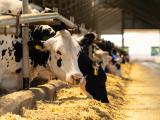Editor's note: This story was updated Nov 15 to include additional information from Food and Drug Administration officials.
Nov 14, 2002 (CIDRAP News) – Federal health officials have announced plans to expand research on whether chronic wasting disease (CWD) in deer and elk poses a threat to humans and other species.
The Food and Drug Administration (FDA) is sponsoring two studies on the potential human health consequences of CWD and whether the disease can be transmitted to humans, Health and Human Services (HHS) Secretary Tommy G. Thompson announced last week.
In addition, the National Institute of Allergy and Infectious Diseases (NIAID) recently awarded a 7-year, $8.4 million contract to establish a CWD research center at Colorado State University in Fort Collins, HHS announced. Research on the disease is also under way at the NIAID's Rocky Mountain Laboratories in Hamilton, Mont.
Chronic wasting disease is one of the transmissible spongiform encephalopathies (TSEs)Ñfatal brain diseases that include bovine spongiform encephalopathy (BSE, or mad cow disease) in cattle, scrapie in sheep and goats, and Creutzfeldt-Jakob disease (CJD) in humans. CWD has been seen in wild deer and elk in Colorado, Wyoming, and Nebraska for years, and also in captive elk in Colorado, Kansas, Montana, Nebraska, Oklahoma, Saskatchewan, and South Dakota. In addition, cases have been found recently in a few wild deer in Wisconsin and a captive elk in Minnesota. No evidence of a link between CWD and similar disease in humans or other animals has been found, but health authorities warn against eating meat from infected deer and elk.
The FDA-sponsored studies will be designed "not only to try to determine and, if present, quantify the human health risk, but also to identify areas where data gaps exist and where research efforts should be focused to reduce the potential threat to health posed by CWD," HHS said in its announcement.
One of the FDA studies will be conducted by the Institute of Food Technologists (IFT), working with the Harvard Center for Risk Analysis at Harvard University. That study will include two parts, one focusing on the risk of BSE transmission through FDA-regulated products and the other dealing with the potential of CWD transmission to humans, according to Lou Carson, deputy director of the food safety staff at the FDA's Center for Food Safety and Applied Nutrition. The study is expected to take 2 years and cost about $500,000, he said.
The CWD risk assessment will involve surveys in several states to estimate how many people hunt and eat deer and elk, Carson told CIDRAP News. Researchers will use that data to suggest how many human illnesses might occur if CWD were transmitted to humans in the same way BSE apparently is transmitted to people who consume contaminated meat from infected cows, resulting in variant CJD.
The other FDA study will use transgenic mice to study the transmissibility of CWD. The FDA will contract with the Centers for Disease Control and Prevention (CDC) to administer the 3-year study, which will be done at the National Prion Disease Pathology and Surveillance Center at Case Western University in Cleveland, Carson said. Mice that carry either a deer gene or a human gene for the normal prion protein found on the surface of brain cells will be exposed to tissue from CWD-infected animals to see if they are susceptible to the disease, he said. He put the cost of the study at $2 million to $3 million.
The BSE phase of the IFT-Harvard study is an effort to adapt a risk assessment model that was previously used by the US Department of Agriculture to estimate the risk of BSE occurring in the United States, according to Carson. The model will be used to assess the likelihood of BSE-contaminated substances getting into products that the FDA regulates, including nonmeat foods and food supplements. "We're basically going to be looking at the pathways and the likelihood of those products getting into the food supply," he said.
Thompson said research on CWD is necessary because the disease "is harming deer and elk herds throughout America," adding, "This is groundbreaking research that will have tangible implications for hunters and farmers."
The new Colorado research center, headed by Edward Hoover, PhD, DVM, will investigate the mechanics of CWD infection in deer and elk, HHS officials said. Researchers also will study "the entire spectrum of disease transmission" and how the disease might cross to other species, and they will try to develop a vaccine to protect deer and elk.
Researchers at the Montana laboratory have been studying CWD for the last few years, HHS reported. The lab plans to investigate whether the abnormal prion protein that is presumed to cause the disease can be transmitted from deer or elk to monkeys if the latter eat meat containing the protein. Recently, scientists at the laboratory found that another TSE, hamster scrapie, can adapt to and cause disease in mice.
In other efforts, researchers at the Rocky Mountain Laboratories:
- Are testing new compounds developed by NIAID that look like promising tools for blocking the formation of prion proteins
- Have developed transgenic mice that are expected to make studying CWD faster and easier; the mice carry the prion proteins of deer and elk and thus are expected to react to the disease as deer and elk would
See also:
HHS news release
http://archive.hhs.gov/news/press/2002pres/20021104.html




















